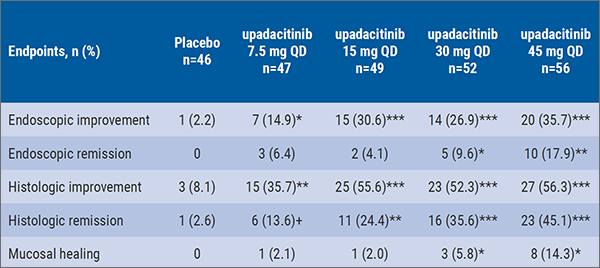“Infliximab in combination with antimetabolite therapy is a standard option for patients with CD,” explained Prof. Edouard Louis (University Hospital Liège, Belgium) [1]. “Clinicians may contemplate de-escalation of this therapy if sustained remission is achieved.” The current, prospective, randomised-controlled, phase 4 SPARE trial (NCT02177071) aimed to assess the relapse rates in patients who continued or withdrew from this combination therapy. Participants with CD (n=211) treated with infliximab and antimetabolites who achieved sustained steroid-free remission (>6 months) were randomised to infliximab withdrawal (n=71), antimetabolite withdrawal (n=69), or therapy continuation (n=71). If relapse occurred, participants were retreated with the agent they withdrew from. The primary endpoints were relapse rate and time spent in remission over 2 years.
Participants who withdrew from infliximab showed significantly higher 2-year relapse rates than participants who continued the combination therapy (40% vs 14%; log-rank P=0.0003) or than participants who discontinued antimetabolite treatment (40% vs 10%; log-rank P<0.0001; see Figure). Notably, 22 out of 23 participants in the infliximab discontinuation arm who relapsed and were subsequently retreated with infliximab achieved remission rapidly. This trend is reflected in the mean time spent in remission, which was only 6 days shorter in the infliximab arm compared with the continuation arm and 14 days shorter compared with the antimetabolite discontinuation arm. Although these differences are small, the pre-specified, non-inferiority criterion for stopping infliximab was not met.
Figure: Relapse rate over time [1]

- Louis E, et al. Withdrawal of infliximab or anti-metabolite therapy in Crohn’s Disease patients in sustained remission on combination therapy: A randomized unblinded controlled trial (SPARE). OP01, ECCO 2022, 16–19 February.
Copyright ©2022 Medicom Medical Publishers
Posted on
Previous Article
« Vedolizumab first approved therapy for chronic pouchitis Next Article
Ozanimod treatment shows maintained response in ulcerative colitis »
« Vedolizumab first approved therapy for chronic pouchitis Next Article
Ozanimod treatment shows maintained response in ulcerative colitis »
Table of Contents: ECCO 2022
Featured articles
Upadacitinib maintenance therapy delivers sustained improvements in active ulcerative colitis
Novel Treatment Modalities
Guselkumab shows encouraging safety and efficacy in ulcerative colitis
Guselkumab maintenance therapy achieved high efficacy rates in Crohn’s disease
Mirikizumab efficacious for active ulcerative colitis
Risankizumab more efficacious in colonic than in ileal Crohn’s disease
Guselkumab plus golimumab promising combination for ulcerative colitis
Combined endpoint may support personalised medicine in ulcerative colitis
Filgotinib seems promising for perianal fistulising Crohn’s disease
Upadacitinib maintenance therapy delivers sustained improvements in active ulcerative colitis
Upadacitinib counters extraintestinal manifestations in ulcerative colitis
Deucravacitinib does not meet primary endpoint for ulcerative colitis
Head-to-Head Comparisons
Anti-TNFs versus vedolizumab and ustekinumab in Crohn’s disease
Upadacitinib appears to be an efficacious therapy for moderately-to-severely ulcerative colitis
Subcutaneous infliximab versus subcutaneous vedolizumab in IBD
Vedolizumab outperforms anti-TNF in biologic-naïve ulcerative colitis
Short-Term and Long-Term Treatment Results
Ozanimod treatment shows maintained response in ulcerative colitis
Stopping infliximab but not antimetabolites leads to more relapses in Crohn’s disease
Vedolizumab first approved therapy for chronic pouchitis
VEDOKIDS: Vedolizumab seems effective in paediatric IBD
Primary endpoint of 5-hydroxytryptophan for fatigue in IBD not met
Specific Therapeutic Strategies
Positive outcomes with therapeutic drug monitoring during infliximab maintenance therapy
Segmental colectomy beneficial over total colectomy in Chrohn’s disease
Modified 2-stage ileal pouch-anal anastomosis versus 3-stage alternative
Similar results for different corticosteroid tapering protocols in UC
Miscellaneous Topics
Lessons from the COVID-19 pandemic for IBD management
AI model distinguishes between histologic activity and remission in ulcerative colitis
Multi-Omic and dietary analysis of Crohn’s disease identifies pathogenetic factors
Novel classification system for perianal fistulising Crohn’s disease
Vaccination tool associated with improved vaccination coverage in IBD
Comparable safety profiles of biological therapies in elderly patients with IBD
Early biologic therapy induces larger effect than delayed treatment in Crohn’s disease
RESTORE-UC: No better outcomes with FMT superdonors than with autologous stools
Related Articles

May 9, 2019
Upadacitinib: data from U-ACHIEVE and CELEST
September 4, 2020
Asymptomatic SARS-CoV-2 infection common in IBD patients
© 2024 Medicom Medical Publishers. All rights reserved. Terms and Conditions | Privacy Policy
HEAD OFFICE
Laarderhoogtweg 25
1101 EB Amsterdam
The Netherlands
T: +31 85 4012 560
E: publishers@medicom-publishers.com

